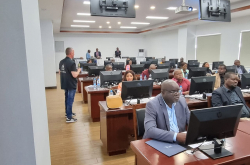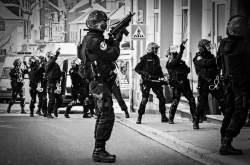LYON, France – The impact of COVID-19 on global terrorism, trends and potential risks related to attacks on vulnerable targets and bioterrorism is the focus of a new report issued by INTERPOL.
The assessment, which is for law enforcement use only, takes into consideration the following five main threat factors:
- COVID-19 outbreak characteristics and medical advances
- Global or national response
- Social climate
- Resilience of the security apparatus
- Strategies and capabilities of terrorists and other non-state actors (NSAs)
As COVID-19 cases subside in some regions and surge in others, the report underlines the critical need to monitor the reaction and response by terrorist networks, violent extremist groups, and other potentially dangerous NSAs.
Economic impact
Early in the pandemic, certain terrorist groups and other NSAs used the pandemic to reinforce their power and influence, particularly among local populations, or to expand their external financial resources. The report also highlights how the impact of COVID-19 on the global economy is likely to indirectly affect funding available to terrorist organizations.
“Our terrorism assessment report is another tool to help law enforcement identify and address these evolving threats, in what continue to be challenging circumstances,” added Secretary General Stock.
The use of disinformation and conspiracy theories also appears as a common denominator across all idealistic spectrums, and as an indicator of prevailing threats against priority targets.
Exploiting divisions
The presence of far-right supporters in anti-COVID-19 activities in a growing number of western countries illustrates attempts to use the pandemic to exploit divisions. Law enforcement will continue to face attempts by far-right violent extremists to radicalize social movements, such as clashing with far-left groups and/or provoking the use of force.
Member countries are encouraged to exchange and crosscheck information related to individuals and groups using COVID-19 conspiracy theories to call and plan for violent acts. Coordinated and consistent use of INTERPOL Notices remain key to anticipate threats resulting from the direct and indirect impact of the pandemic.
The INTERPOL report also underscores how the recurring reinstatement of restrictive measures is likely to sustain a degree of civil unrest as well as impact on the choice of timing and targets for terrorist acts.
The report includes recommendations and early-warning signs for the global law enforcement community to monitor in addressing these threats.
Related news

Border security threats focus of STOP operations in Africa
8 December 2023








